Detailed Case Study: Income Derivation & Tax Law - Arthur Murray (NSW)
VerifiedAdded on 2023/06/12
|10
|2958
|254
Case Study
AI Summary
This case study provides a detailed analysis of the Arthur Murray (N.S.W.) Pty Ltd v. Commissioner of Taxation of the Commonwealth case, focusing on the interpretation of 'income derived' under Section 25(1) of the Income Tax Assessment Act 1936. The case revolves around advance payments for dancing lessons and whether these payments should be considered income in the year received or when the lessons are provided. The analysis extends to RIP Pty Ltd, a funeral service provider, examining how the Arthur Murray principle applies to their revenue recognition, particularly concerning advance fees for funeral plans. The study also discusses the taxpayer's and Commissioner's choices in accounting methods, emphasizing the need for methods that accurately reflect income. The conclusion highlights that amounts in the forfeited account are assessable income under Section 6-5 of the ITAA 97, and trading stock definitions under Section 70-10 are also addressed.
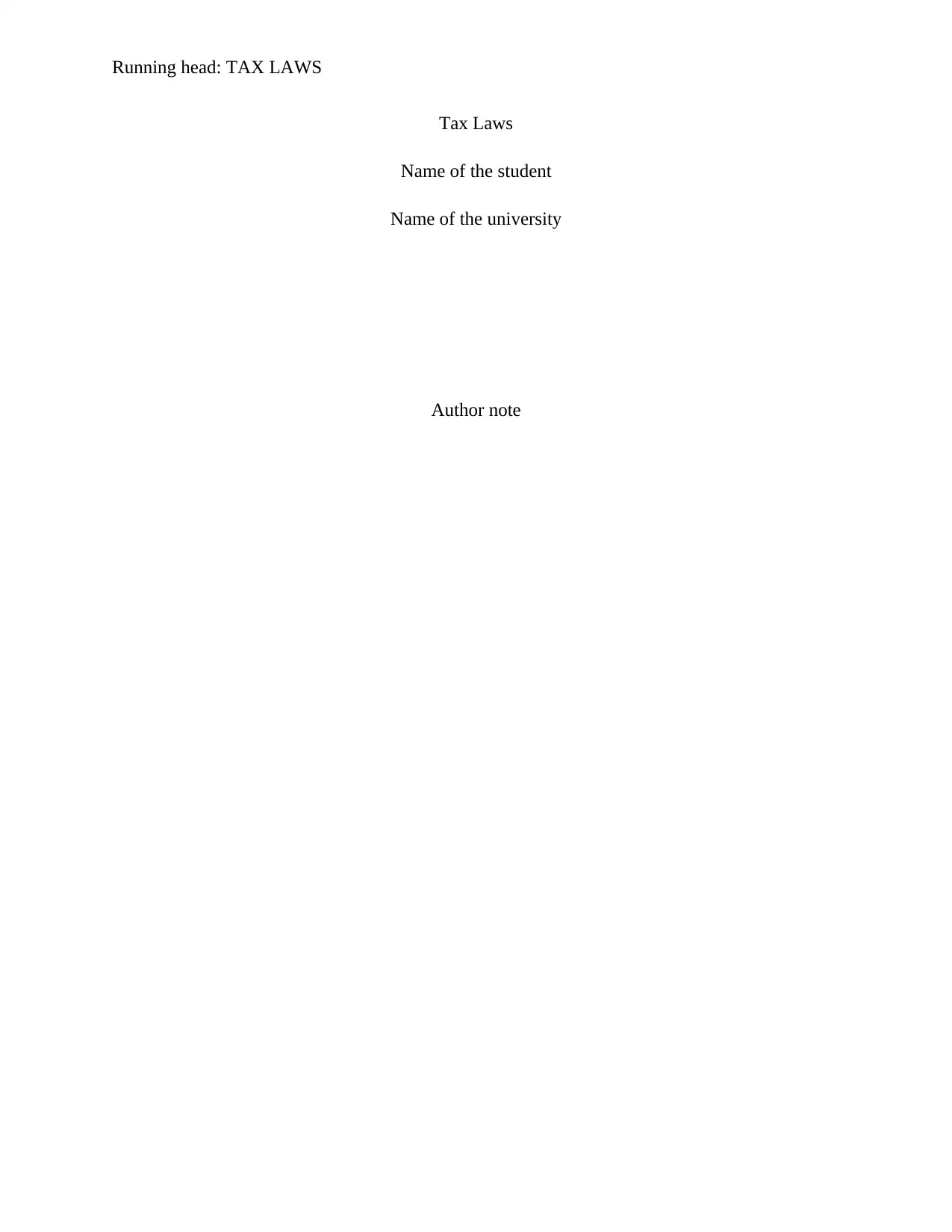
Running head: TAX LAWS
Tax Laws
Name of the student
Name of the university
Author note
Tax Laws
Name of the student
Name of the university
Author note
Paraphrase This Document
Need a fresh take? Get an instant paraphrase of this document with our AI Paraphraser
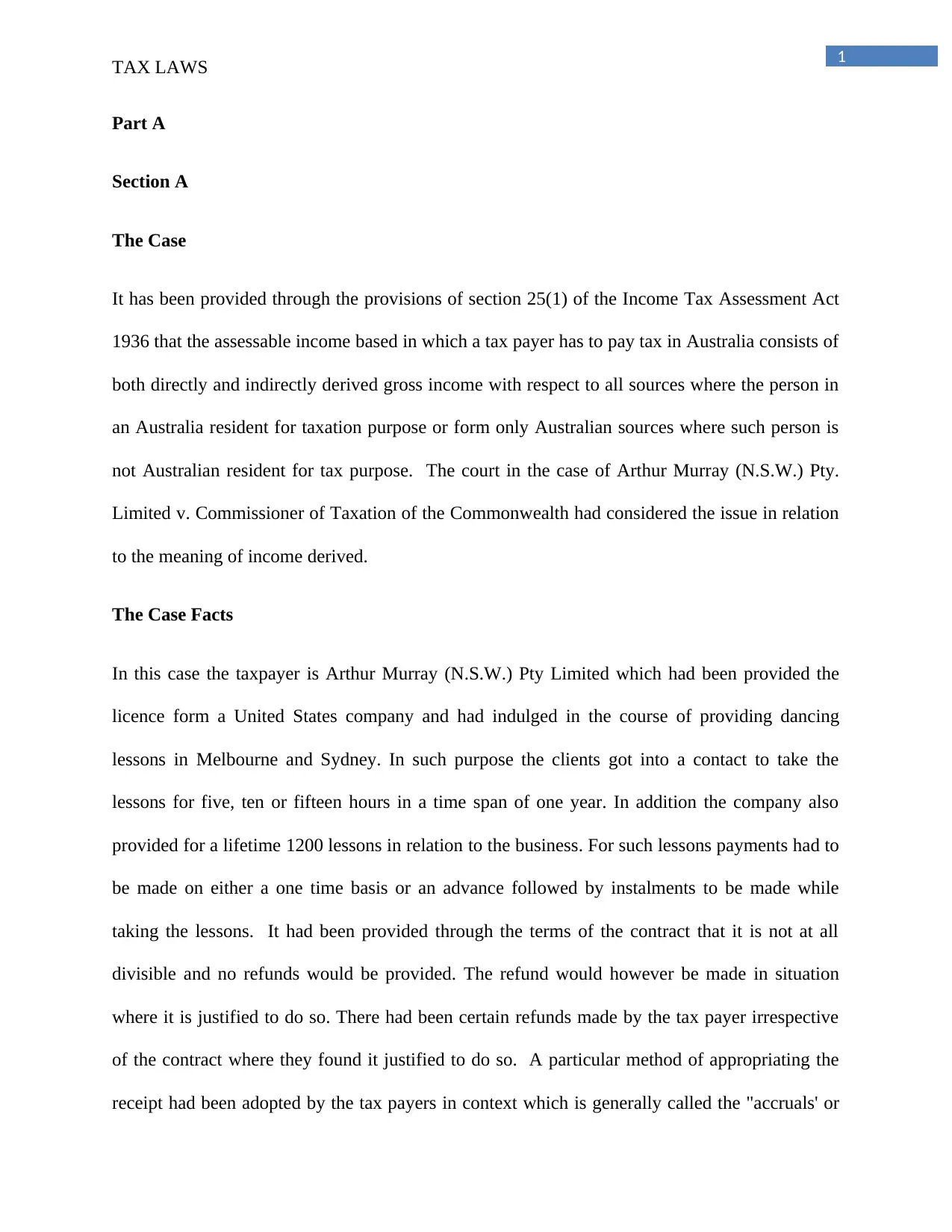
1
TAX LAWS
Part A
Section A
The Case
It has been provided through the provisions of section 25(1) of the Income Tax Assessment Act
1936 that the assessable income based in which a tax payer has to pay tax in Australia consists of
both directly and indirectly derived gross income with respect to all sources where the person in
an Australia resident for taxation purpose or form only Australian sources where such person is
not Australian resident for tax purpose. The court in the case of Arthur Murray (N.S.W.) Pty.
Limited v. Commissioner of Taxation of the Commonwealth had considered the issue in relation
to the meaning of income derived.
The Case Facts
In this case the taxpayer is Arthur Murray (N.S.W.) Pty Limited which had been provided the
licence form a United States company and had indulged in the course of providing dancing
lessons in Melbourne and Sydney. In such purpose the clients got into a contact to take the
lessons for five, ten or fifteen hours in a time span of one year. In addition the company also
provided for a lifetime 1200 lessons in relation to the business. For such lessons payments had to
be made on either a one time basis or an advance followed by instalments to be made while
taking the lessons. It had been provided through the terms of the contract that it is not at all
divisible and no refunds would be provided. The refund would however be made in situation
where it is justified to do so. There had been certain refunds made by the tax payer irrespective
of the contract where they found it justified to do so. A particular method of appropriating the
receipt had been adopted by the tax payers in context which is generally called the "accruals' or
TAX LAWS
Part A
Section A
The Case
It has been provided through the provisions of section 25(1) of the Income Tax Assessment Act
1936 that the assessable income based in which a tax payer has to pay tax in Australia consists of
both directly and indirectly derived gross income with respect to all sources where the person in
an Australia resident for taxation purpose or form only Australian sources where such person is
not Australian resident for tax purpose. The court in the case of Arthur Murray (N.S.W.) Pty.
Limited v. Commissioner of Taxation of the Commonwealth had considered the issue in relation
to the meaning of income derived.
The Case Facts
In this case the taxpayer is Arthur Murray (N.S.W.) Pty Limited which had been provided the
licence form a United States company and had indulged in the course of providing dancing
lessons in Melbourne and Sydney. In such purpose the clients got into a contact to take the
lessons for five, ten or fifteen hours in a time span of one year. In addition the company also
provided for a lifetime 1200 lessons in relation to the business. For such lessons payments had to
be made on either a one time basis or an advance followed by instalments to be made while
taking the lessons. It had been provided through the terms of the contract that it is not at all
divisible and no refunds would be provided. The refund would however be made in situation
where it is justified to do so. There had been certain refunds made by the tax payer irrespective
of the contract where they found it justified to do so. A particular method of appropriating the
receipt had been adopted by the tax payers in context which is generally called the "accruals' or
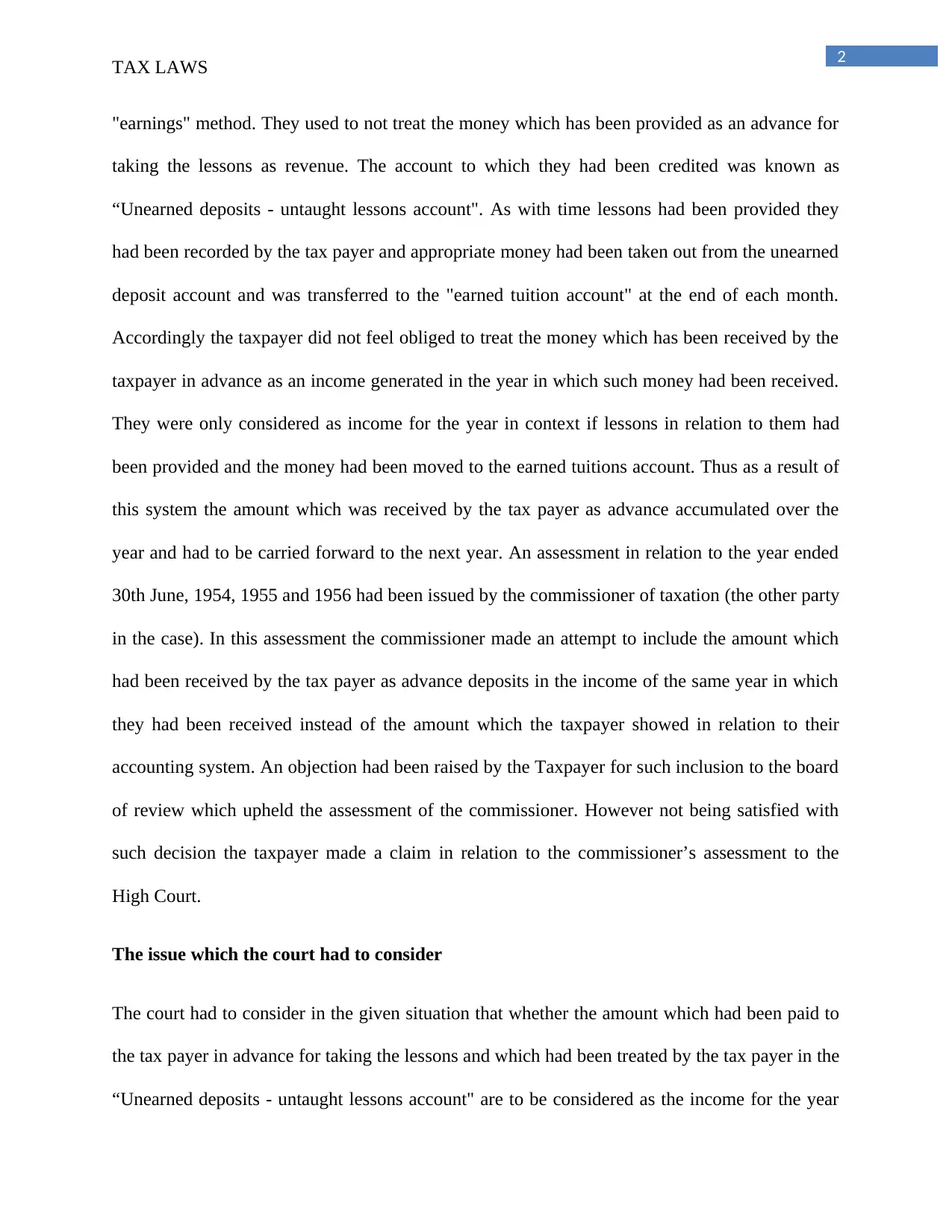
2
TAX LAWS
"earnings" method. They used to not treat the money which has been provided as an advance for
taking the lessons as revenue. The account to which they had been credited was known as
“Unearned deposits - untaught lessons account". As with time lessons had been provided they
had been recorded by the tax payer and appropriate money had been taken out from the unearned
deposit account and was transferred to the "earned tuition account" at the end of each month.
Accordingly the taxpayer did not feel obliged to treat the money which has been received by the
taxpayer in advance as an income generated in the year in which such money had been received.
They were only considered as income for the year in context if lessons in relation to them had
been provided and the money had been moved to the earned tuitions account. Thus as a result of
this system the amount which was received by the tax payer as advance accumulated over the
year and had to be carried forward to the next year. An assessment in relation to the year ended
30th June, 1954, 1955 and 1956 had been issued by the commissioner of taxation (the other party
in the case). In this assessment the commissioner made an attempt to include the amount which
had been received by the tax payer as advance deposits in the income of the same year in which
they had been received instead of the amount which the taxpayer showed in relation to their
accounting system. An objection had been raised by the Taxpayer for such inclusion to the board
of review which upheld the assessment of the commissioner. However not being satisfied with
such decision the taxpayer made a claim in relation to the commissioner’s assessment to the
High Court.
The issue which the court had to consider
The court had to consider in the given situation that whether the amount which had been paid to
the tax payer in advance for taking the lessons and which had been treated by the tax payer in the
“Unearned deposits - untaught lessons account" are to be considered as the income for the year
TAX LAWS
"earnings" method. They used to not treat the money which has been provided as an advance for
taking the lessons as revenue. The account to which they had been credited was known as
“Unearned deposits - untaught lessons account". As with time lessons had been provided they
had been recorded by the tax payer and appropriate money had been taken out from the unearned
deposit account and was transferred to the "earned tuition account" at the end of each month.
Accordingly the taxpayer did not feel obliged to treat the money which has been received by the
taxpayer in advance as an income generated in the year in which such money had been received.
They were only considered as income for the year in context if lessons in relation to them had
been provided and the money had been moved to the earned tuitions account. Thus as a result of
this system the amount which was received by the tax payer as advance accumulated over the
year and had to be carried forward to the next year. An assessment in relation to the year ended
30th June, 1954, 1955 and 1956 had been issued by the commissioner of taxation (the other party
in the case). In this assessment the commissioner made an attempt to include the amount which
had been received by the tax payer as advance deposits in the income of the same year in which
they had been received instead of the amount which the taxpayer showed in relation to their
accounting system. An objection had been raised by the Taxpayer for such inclusion to the board
of review which upheld the assessment of the commissioner. However not being satisfied with
such decision the taxpayer made a claim in relation to the commissioner’s assessment to the
High Court.
The issue which the court had to consider
The court had to consider in the given situation that whether the amount which had been paid to
the tax payer in advance for taking the lessons and which had been treated by the tax payer in the
“Unearned deposits - untaught lessons account" are to be considered as the income for the year
⊘ This is a preview!⊘
Do you want full access?
Subscribe today to unlock all pages.

Trusted by 1+ million students worldwide
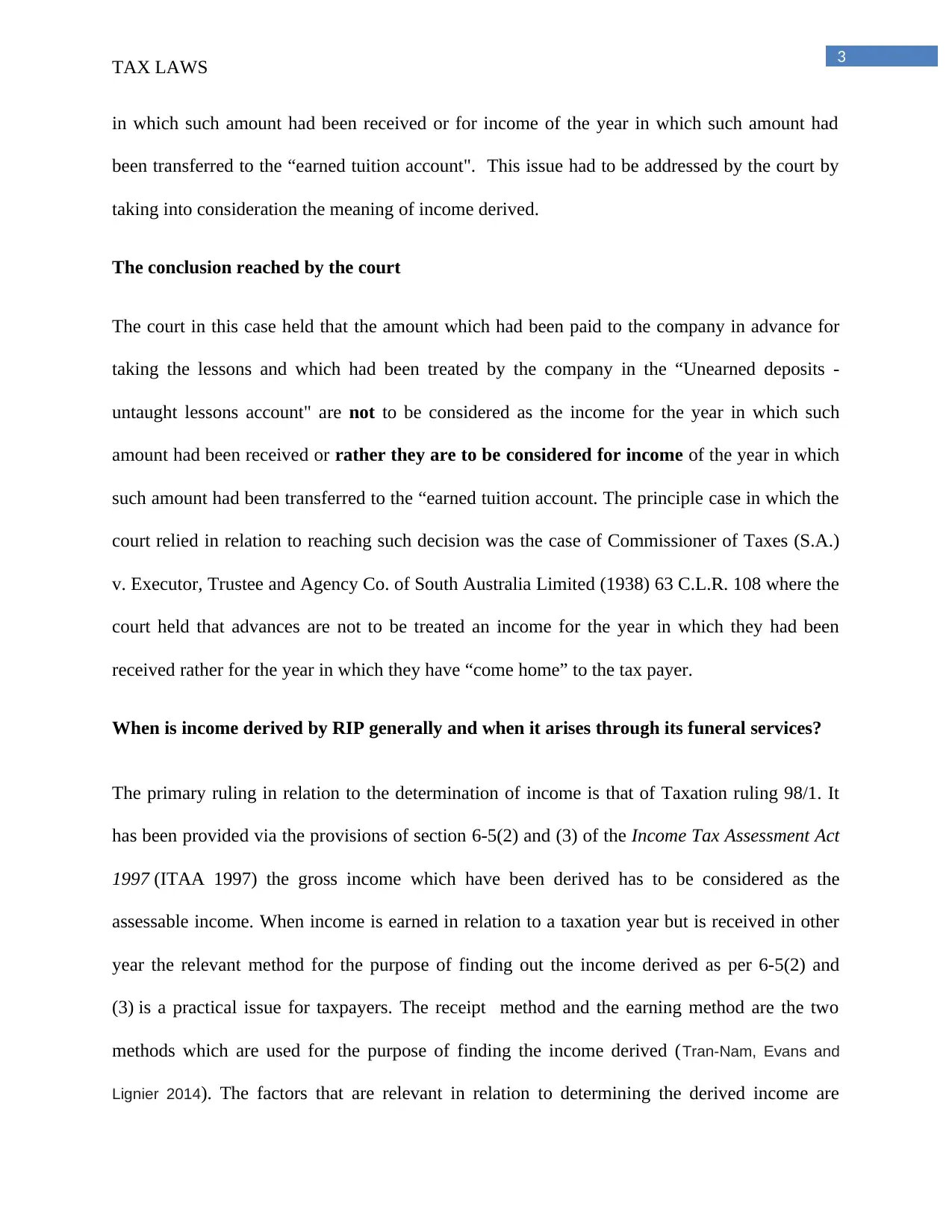
3
TAX LAWS
in which such amount had been received or for income of the year in which such amount had
been transferred to the “earned tuition account". This issue had to be addressed by the court by
taking into consideration the meaning of income derived.
The conclusion reached by the court
The court in this case held that the amount which had been paid to the company in advance for
taking the lessons and which had been treated by the company in the “Unearned deposits -
untaught lessons account" are not to be considered as the income for the year in which such
amount had been received or rather they are to be considered for income of the year in which
such amount had been transferred to the “earned tuition account. The principle case in which the
court relied in relation to reaching such decision was the case of Commissioner of Taxes (S.A.)
v. Executor, Trustee and Agency Co. of South Australia Limited (1938) 63 C.L.R. 108 where the
court held that advances are not to be treated an income for the year in which they had been
received rather for the year in which they have “come home” to the tax payer.
When is income derived by RIP generally and when it arises through its funeral services?
The primary ruling in relation to the determination of income is that of Taxation ruling 98/1. It
has been provided via the provisions of section 6-5(2) and (3) of the Income Tax Assessment Act
1997 (ITAA 1997) the gross income which have been derived has to be considered as the
assessable income. When income is earned in relation to a taxation year but is received in other
year the relevant method for the purpose of finding out the income derived as per 6-5(2) and
(3) is a practical issue for taxpayers. The receipt method and the earning method are the two
methods which are used for the purpose of finding the income derived (Tran-Nam, Evans and
Lignier 2014). The factors that are relevant in relation to determining the derived income are
TAX LAWS
in which such amount had been received or for income of the year in which such amount had
been transferred to the “earned tuition account". This issue had to be addressed by the court by
taking into consideration the meaning of income derived.
The conclusion reached by the court
The court in this case held that the amount which had been paid to the company in advance for
taking the lessons and which had been treated by the company in the “Unearned deposits -
untaught lessons account" are not to be considered as the income for the year in which such
amount had been received or rather they are to be considered for income of the year in which
such amount had been transferred to the “earned tuition account. The principle case in which the
court relied in relation to reaching such decision was the case of Commissioner of Taxes (S.A.)
v. Executor, Trustee and Agency Co. of South Australia Limited (1938) 63 C.L.R. 108 where the
court held that advances are not to be treated an income for the year in which they had been
received rather for the year in which they have “come home” to the tax payer.
When is income derived by RIP generally and when it arises through its funeral services?
The primary ruling in relation to the determination of income is that of Taxation ruling 98/1. It
has been provided via the provisions of section 6-5(2) and (3) of the Income Tax Assessment Act
1997 (ITAA 1997) the gross income which have been derived has to be considered as the
assessable income. When income is earned in relation to a taxation year but is received in other
year the relevant method for the purpose of finding out the income derived as per 6-5(2) and
(3) is a practical issue for taxpayers. The receipt method and the earning method are the two
methods which are used for the purpose of finding the income derived (Tran-Nam, Evans and
Lignier 2014). The factors that are relevant in relation to determining the derived income are
Paraphrase This Document
Need a fresh take? Get an instant paraphrase of this document with our AI Paraphraser
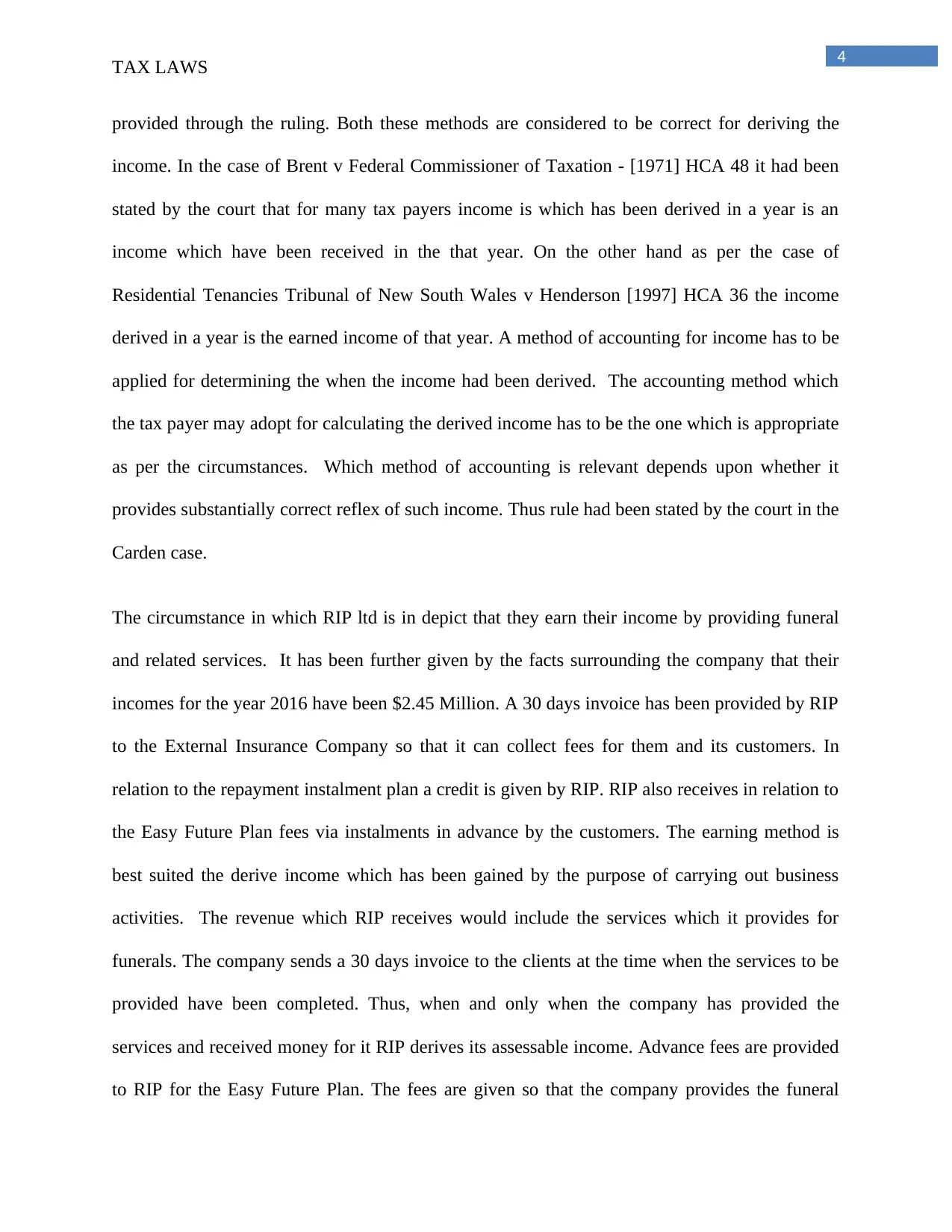
4
TAX LAWS
provided through the ruling. Both these methods are considered to be correct for deriving the
income. In the case of Brent v Federal Commissioner of Taxation - [1971] HCA 48 it had been
stated by the court that for many tax payers income is which has been derived in a year is an
income which have been received in the that year. On the other hand as per the case of
Residential Tenancies Tribunal of New South Wales v Henderson [1997] HCA 36 the income
derived in a year is the earned income of that year. A method of accounting for income has to be
applied for determining the when the income had been derived. The accounting method which
the tax payer may adopt for calculating the derived income has to be the one which is appropriate
as per the circumstances. Which method of accounting is relevant depends upon whether it
provides substantially correct reflex of such income. Thus rule had been stated by the court in the
Carden case.
The circumstance in which RIP ltd is in depict that they earn their income by providing funeral
and related services. It has been further given by the facts surrounding the company that their
incomes for the year 2016 have been $2.45 Million. A 30 days invoice has been provided by RIP
to the External Insurance Company so that it can collect fees for them and its customers. In
relation to the repayment instalment plan a credit is given by RIP. RIP also receives in relation to
the Easy Future Plan fees via instalments in advance by the customers. The earning method is
best suited the derive income which has been gained by the purpose of carrying out business
activities. The revenue which RIP receives would include the services which it provides for
funerals. The company sends a 30 days invoice to the clients at the time when the services to be
provided have been completed. Thus, when and only when the company has provided the
services and received money for it RIP derives its assessable income. Advance fees are provided
to RIP for the Easy Future Plan. The fees are given so that the company provides the funeral
TAX LAWS
provided through the ruling. Both these methods are considered to be correct for deriving the
income. In the case of Brent v Federal Commissioner of Taxation - [1971] HCA 48 it had been
stated by the court that for many tax payers income is which has been derived in a year is an
income which have been received in the that year. On the other hand as per the case of
Residential Tenancies Tribunal of New South Wales v Henderson [1997] HCA 36 the income
derived in a year is the earned income of that year. A method of accounting for income has to be
applied for determining the when the income had been derived. The accounting method which
the tax payer may adopt for calculating the derived income has to be the one which is appropriate
as per the circumstances. Which method of accounting is relevant depends upon whether it
provides substantially correct reflex of such income. Thus rule had been stated by the court in the
Carden case.
The circumstance in which RIP ltd is in depict that they earn their income by providing funeral
and related services. It has been further given by the facts surrounding the company that their
incomes for the year 2016 have been $2.45 Million. A 30 days invoice has been provided by RIP
to the External Insurance Company so that it can collect fees for them and its customers. In
relation to the repayment instalment plan a credit is given by RIP. RIP also receives in relation to
the Easy Future Plan fees via instalments in advance by the customers. The earning method is
best suited the derive income which has been gained by the purpose of carrying out business
activities. The revenue which RIP receives would include the services which it provides for
funerals. The company sends a 30 days invoice to the clients at the time when the services to be
provided have been completed. Thus, when and only when the company has provided the
services and received money for it RIP derives its assessable income. Advance fees are provided
to RIP for the Easy Future Plan. The fees are given so that the company provides the funeral
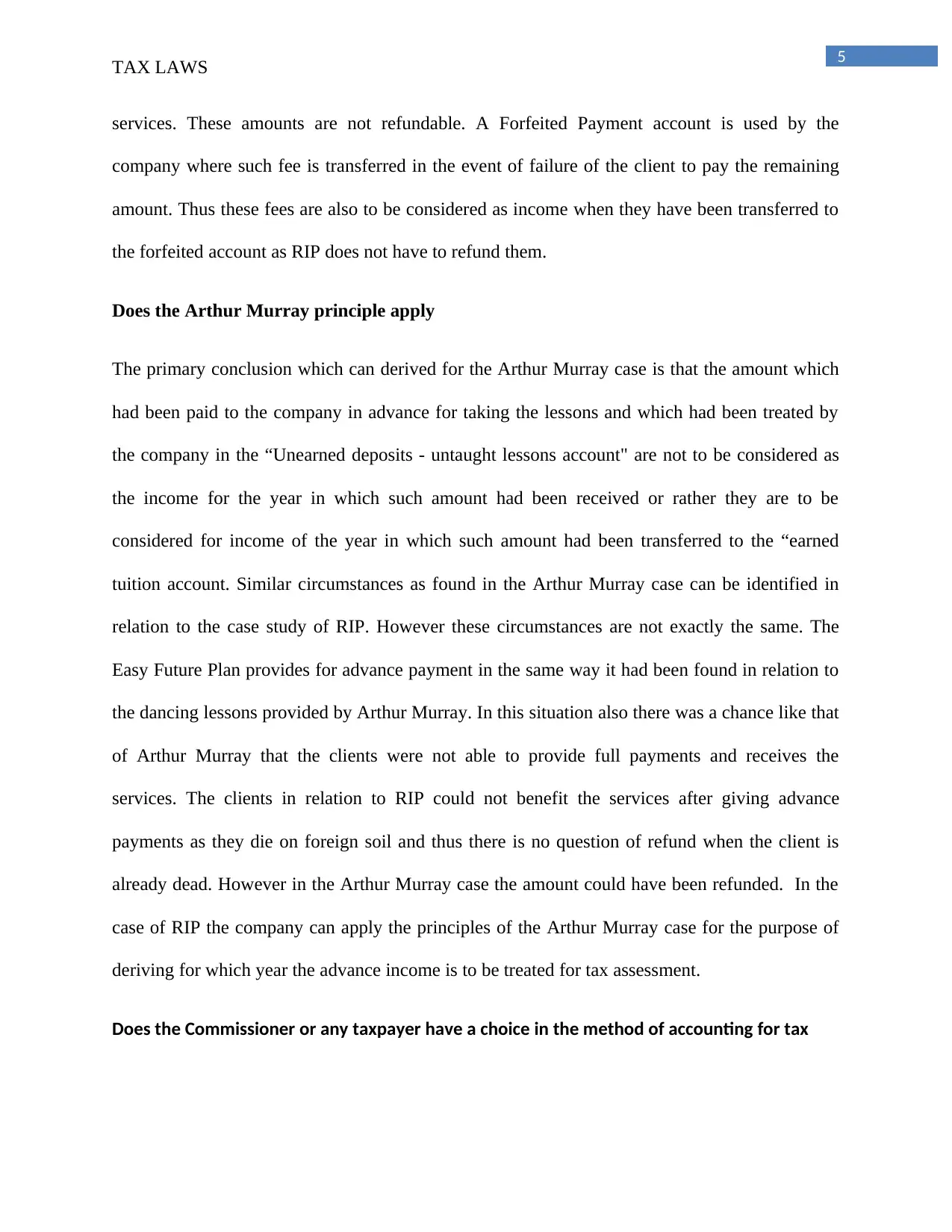
5
TAX LAWS
services. These amounts are not refundable. A Forfeited Payment account is used by the
company where such fee is transferred in the event of failure of the client to pay the remaining
amount. Thus these fees are also to be considered as income when they have been transferred to
the forfeited account as RIP does not have to refund them.
Does the Arthur Murray principle apply
The primary conclusion which can derived for the Arthur Murray case is that the amount which
had been paid to the company in advance for taking the lessons and which had been treated by
the company in the “Unearned deposits - untaught lessons account" are not to be considered as
the income for the year in which such amount had been received or rather they are to be
considered for income of the year in which such amount had been transferred to the “earned
tuition account. Similar circumstances as found in the Arthur Murray case can be identified in
relation to the case study of RIP. However these circumstances are not exactly the same. The
Easy Future Plan provides for advance payment in the same way it had been found in relation to
the dancing lessons provided by Arthur Murray. In this situation also there was a chance like that
of Arthur Murray that the clients were not able to provide full payments and receives the
services. The clients in relation to RIP could not benefit the services after giving advance
payments as they die on foreign soil and thus there is no question of refund when the client is
already dead. However in the Arthur Murray case the amount could have been refunded. In the
case of RIP the company can apply the principles of the Arthur Murray case for the purpose of
deriving for which year the advance income is to be treated for tax assessment.
Does the Commissioner or any taxpayer have a choice in the method of accounting for tax
TAX LAWS
services. These amounts are not refundable. A Forfeited Payment account is used by the
company where such fee is transferred in the event of failure of the client to pay the remaining
amount. Thus these fees are also to be considered as income when they have been transferred to
the forfeited account as RIP does not have to refund them.
Does the Arthur Murray principle apply
The primary conclusion which can derived for the Arthur Murray case is that the amount which
had been paid to the company in advance for taking the lessons and which had been treated by
the company in the “Unearned deposits - untaught lessons account" are not to be considered as
the income for the year in which such amount had been received or rather they are to be
considered for income of the year in which such amount had been transferred to the “earned
tuition account. Similar circumstances as found in the Arthur Murray case can be identified in
relation to the case study of RIP. However these circumstances are not exactly the same. The
Easy Future Plan provides for advance payment in the same way it had been found in relation to
the dancing lessons provided by Arthur Murray. In this situation also there was a chance like that
of Arthur Murray that the clients were not able to provide full payments and receives the
services. The clients in relation to RIP could not benefit the services after giving advance
payments as they die on foreign soil and thus there is no question of refund when the client is
already dead. However in the Arthur Murray case the amount could have been refunded. In the
case of RIP the company can apply the principles of the Arthur Murray case for the purpose of
deriving for which year the advance income is to be treated for tax assessment.
Does the Commissioner or any taxpayer have a choice in the method of accounting for tax
⊘ This is a preview!⊘
Do you want full access?
Subscribe today to unlock all pages.

Trusted by 1+ million students worldwide
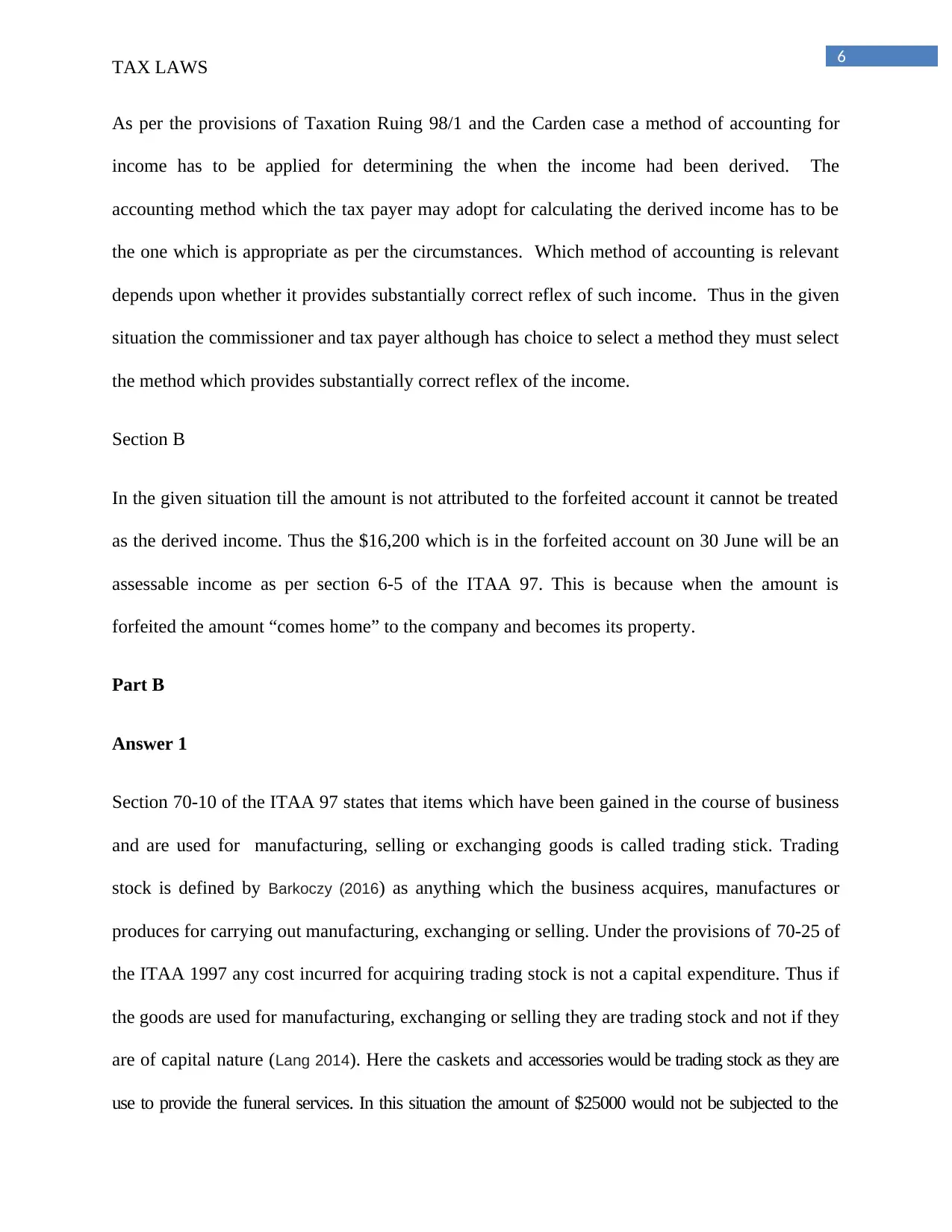
6
TAX LAWS
As per the provisions of Taxation Ruing 98/1 and the Carden case a method of accounting for
income has to be applied for determining the when the income had been derived. The
accounting method which the tax payer may adopt for calculating the derived income has to be
the one which is appropriate as per the circumstances. Which method of accounting is relevant
depends upon whether it provides substantially correct reflex of such income. Thus in the given
situation the commissioner and tax payer although has choice to select a method they must select
the method which provides substantially correct reflex of the income.
Section B
In the given situation till the amount is not attributed to the forfeited account it cannot be treated
as the derived income. Thus the $16,200 which is in the forfeited account on 30 June will be an
assessable income as per section 6-5 of the ITAA 97. This is because when the amount is
forfeited the amount “comes home” to the company and becomes its property.
Part B
Answer 1
Section 70-10 of the ITAA 97 states that items which have been gained in the course of business
and are used for manufacturing, selling or exchanging goods is called trading stick. Trading
stock is defined by Barkoczy (2016) as anything which the business acquires, manufactures or
produces for carrying out manufacturing, exchanging or selling. Under the provisions of 70-25 of
the ITAA 1997 any cost incurred for acquiring trading stock is not a capital expenditure. Thus if
the goods are used for manufacturing, exchanging or selling they are trading stock and not if they
are of capital nature (Lang 2014). Here the caskets and accessories would be trading stock as they are
use to provide the funeral services. In this situation the amount of $25000 would not be subjected to the
TAX LAWS
As per the provisions of Taxation Ruing 98/1 and the Carden case a method of accounting for
income has to be applied for determining the when the income had been derived. The
accounting method which the tax payer may adopt for calculating the derived income has to be
the one which is appropriate as per the circumstances. Which method of accounting is relevant
depends upon whether it provides substantially correct reflex of such income. Thus in the given
situation the commissioner and tax payer although has choice to select a method they must select
the method which provides substantially correct reflex of the income.
Section B
In the given situation till the amount is not attributed to the forfeited account it cannot be treated
as the derived income. Thus the $16,200 which is in the forfeited account on 30 June will be an
assessable income as per section 6-5 of the ITAA 97. This is because when the amount is
forfeited the amount “comes home” to the company and becomes its property.
Part B
Answer 1
Section 70-10 of the ITAA 97 states that items which have been gained in the course of business
and are used for manufacturing, selling or exchanging goods is called trading stick. Trading
stock is defined by Barkoczy (2016) as anything which the business acquires, manufactures or
produces for carrying out manufacturing, exchanging or selling. Under the provisions of 70-25 of
the ITAA 1997 any cost incurred for acquiring trading stock is not a capital expenditure. Thus if
the goods are used for manufacturing, exchanging or selling they are trading stock and not if they
are of capital nature (Lang 2014). Here the caskets and accessories would be trading stock as they are
use to provide the funeral services. In this situation the amount of $25000 would not be subjected to the
Paraphrase This Document
Need a fresh take? Get an instant paraphrase of this document with our AI Paraphraser
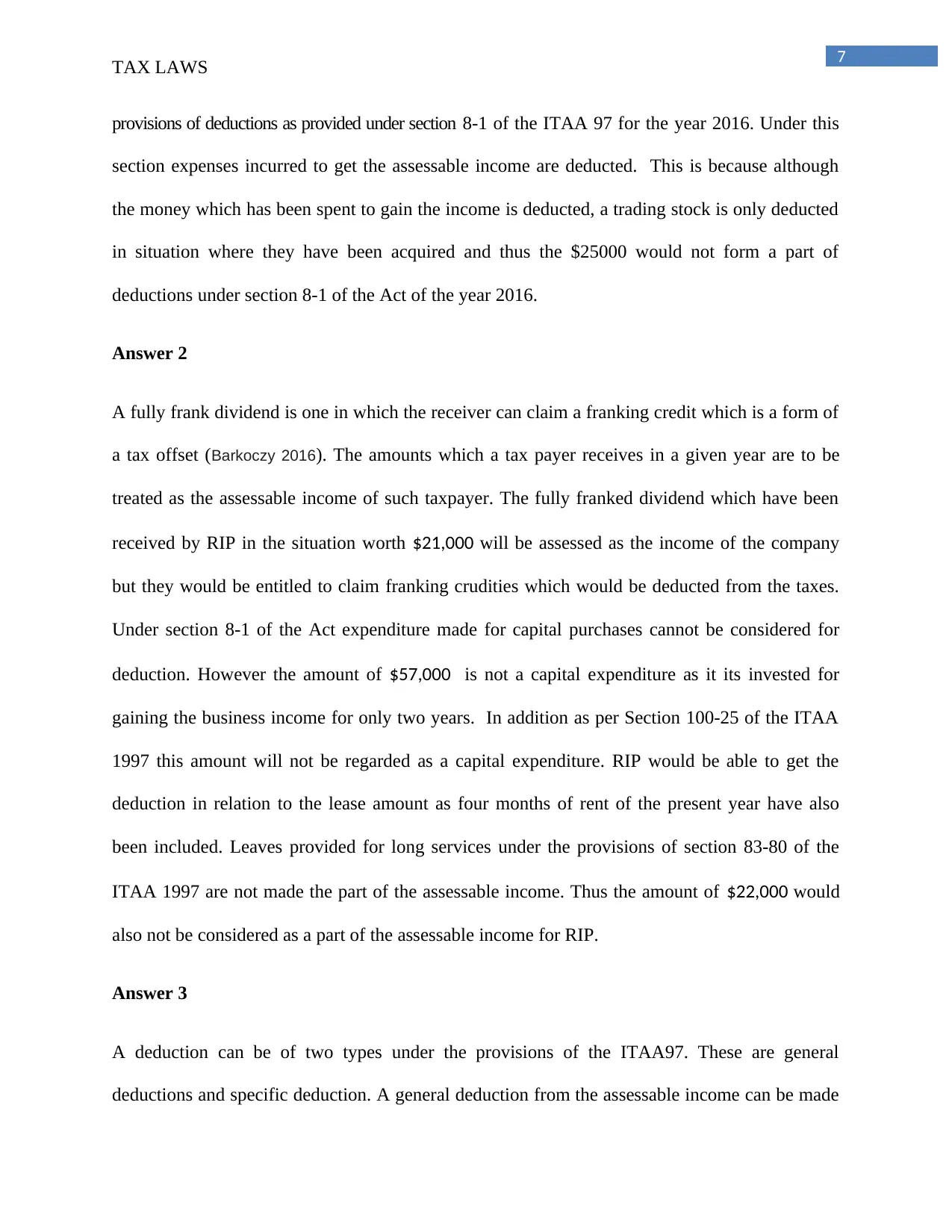
7
TAX LAWS
provisions of deductions as provided under section 8-1 of the ITAA 97 for the year 2016. Under this
section expenses incurred to get the assessable income are deducted. This is because although
the money which has been spent to gain the income is deducted, a trading stock is only deducted
in situation where they have been acquired and thus the $25000 would not form a part of
deductions under section 8-1 of the Act of the year 2016.
Answer 2
A fully frank dividend is one in which the receiver can claim a franking credit which is a form of
a tax offset (Barkoczy 2016). The amounts which a tax payer receives in a given year are to be
treated as the assessable income of such taxpayer. The fully franked dividend which have been
received by RIP in the situation worth $21,000 will be assessed as the income of the company
but they would be entitled to claim franking crudities which would be deducted from the taxes.
Under section 8-1 of the Act expenditure made for capital purchases cannot be considered for
deduction. However the amount of $57,000 is not a capital expenditure as it its invested for
gaining the business income for only two years. In addition as per Section 100-25 of the ITAA
1997 this amount will not be regarded as a capital expenditure. RIP would be able to get the
deduction in relation to the lease amount as four months of rent of the present year have also
been included. Leaves provided for long services under the provisions of section 83-80 of the
ITAA 1997 are not made the part of the assessable income. Thus the amount of $22,000 would
also not be considered as a part of the assessable income for RIP.
Answer 3
A deduction can be of two types under the provisions of the ITAA97. These are general
deductions and specific deduction. A general deduction from the assessable income can be made
TAX LAWS
provisions of deductions as provided under section 8-1 of the ITAA 97 for the year 2016. Under this
section expenses incurred to get the assessable income are deducted. This is because although
the money which has been spent to gain the income is deducted, a trading stock is only deducted
in situation where they have been acquired and thus the $25000 would not form a part of
deductions under section 8-1 of the Act of the year 2016.
Answer 2
A fully frank dividend is one in which the receiver can claim a franking credit which is a form of
a tax offset (Barkoczy 2016). The amounts which a tax payer receives in a given year are to be
treated as the assessable income of such taxpayer. The fully franked dividend which have been
received by RIP in the situation worth $21,000 will be assessed as the income of the company
but they would be entitled to claim franking crudities which would be deducted from the taxes.
Under section 8-1 of the Act expenditure made for capital purchases cannot be considered for
deduction. However the amount of $57,000 is not a capital expenditure as it its invested for
gaining the business income for only two years. In addition as per Section 100-25 of the ITAA
1997 this amount will not be regarded as a capital expenditure. RIP would be able to get the
deduction in relation to the lease amount as four months of rent of the present year have also
been included. Leaves provided for long services under the provisions of section 83-80 of the
ITAA 1997 are not made the part of the assessable income. Thus the amount of $22,000 would
also not be considered as a part of the assessable income for RIP.
Answer 3
A deduction can be of two types under the provisions of the ITAA97. These are general
deductions and specific deduction. A general deduction from the assessable income can be made
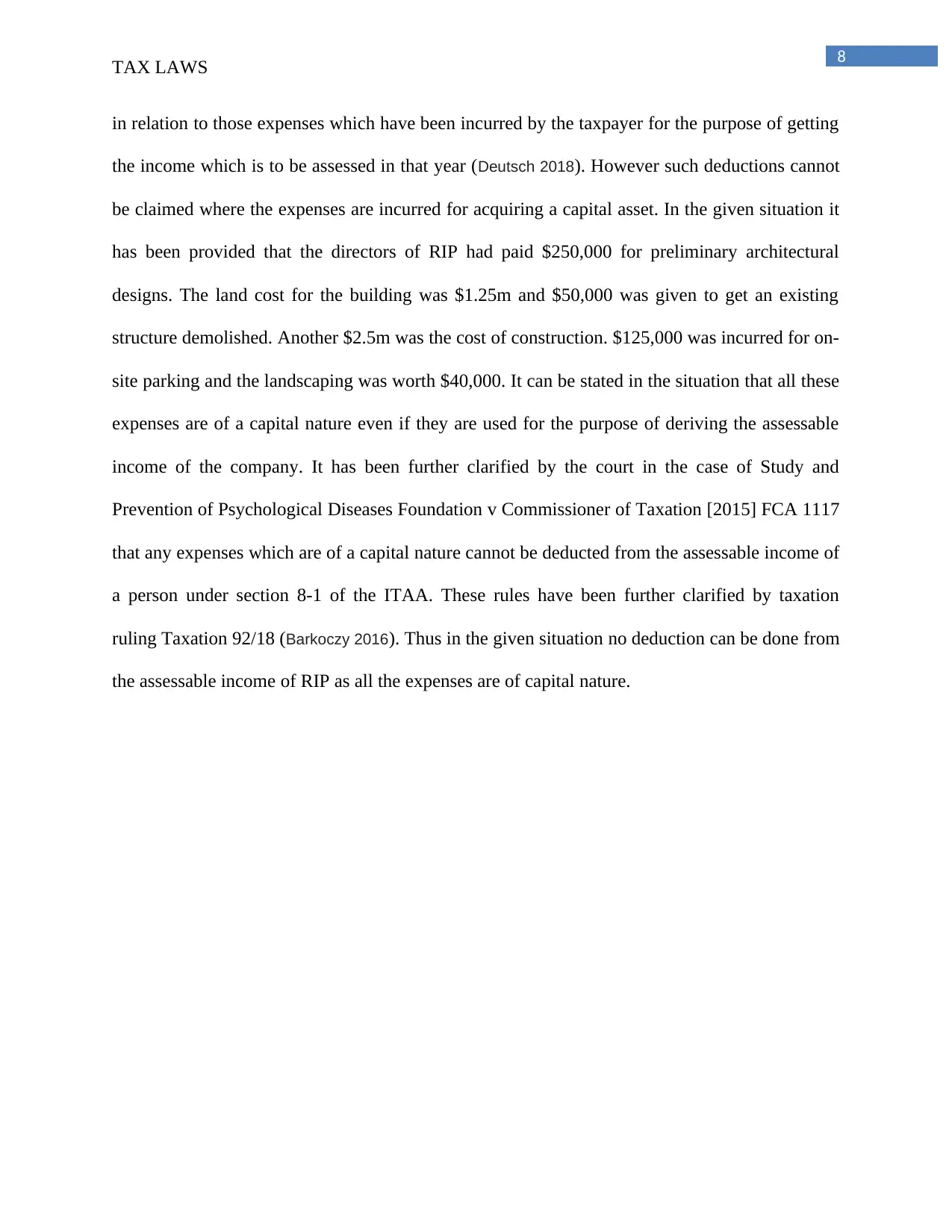
8
TAX LAWS
in relation to those expenses which have been incurred by the taxpayer for the purpose of getting
the income which is to be assessed in that year (Deutsch 2018). However such deductions cannot
be claimed where the expenses are incurred for acquiring a capital asset. In the given situation it
has been provided that the directors of RIP had paid $250,000 for preliminary architectural
designs. The land cost for the building was $1.25m and $50,000 was given to get an existing
structure demolished. Another $2.5m was the cost of construction. $125,000 was incurred for on-
site parking and the landscaping was worth $40,000. It can be stated in the situation that all these
expenses are of a capital nature even if they are used for the purpose of deriving the assessable
income of the company. It has been further clarified by the court in the case of Study and
Prevention of Psychological Diseases Foundation v Commissioner of Taxation [2015] FCA 1117
that any expenses which are of a capital nature cannot be deducted from the assessable income of
a person under section 8-1 of the ITAA. These rules have been further clarified by taxation
ruling Taxation 92/18 (Barkoczy 2016). Thus in the given situation no deduction can be done from
the assessable income of RIP as all the expenses are of capital nature.
TAX LAWS
in relation to those expenses which have been incurred by the taxpayer for the purpose of getting
the income which is to be assessed in that year (Deutsch 2018). However such deductions cannot
be claimed where the expenses are incurred for acquiring a capital asset. In the given situation it
has been provided that the directors of RIP had paid $250,000 for preliminary architectural
designs. The land cost for the building was $1.25m and $50,000 was given to get an existing
structure demolished. Another $2.5m was the cost of construction. $125,000 was incurred for on-
site parking and the landscaping was worth $40,000. It can be stated in the situation that all these
expenses are of a capital nature even if they are used for the purpose of deriving the assessable
income of the company. It has been further clarified by the court in the case of Study and
Prevention of Psychological Diseases Foundation v Commissioner of Taxation [2015] FCA 1117
that any expenses which are of a capital nature cannot be deducted from the assessable income of
a person under section 8-1 of the ITAA. These rules have been further clarified by taxation
ruling Taxation 92/18 (Barkoczy 2016). Thus in the given situation no deduction can be done from
the assessable income of RIP as all the expenses are of capital nature.
⊘ This is a preview!⊘
Do you want full access?
Subscribe today to unlock all pages.

Trusted by 1+ million students worldwide
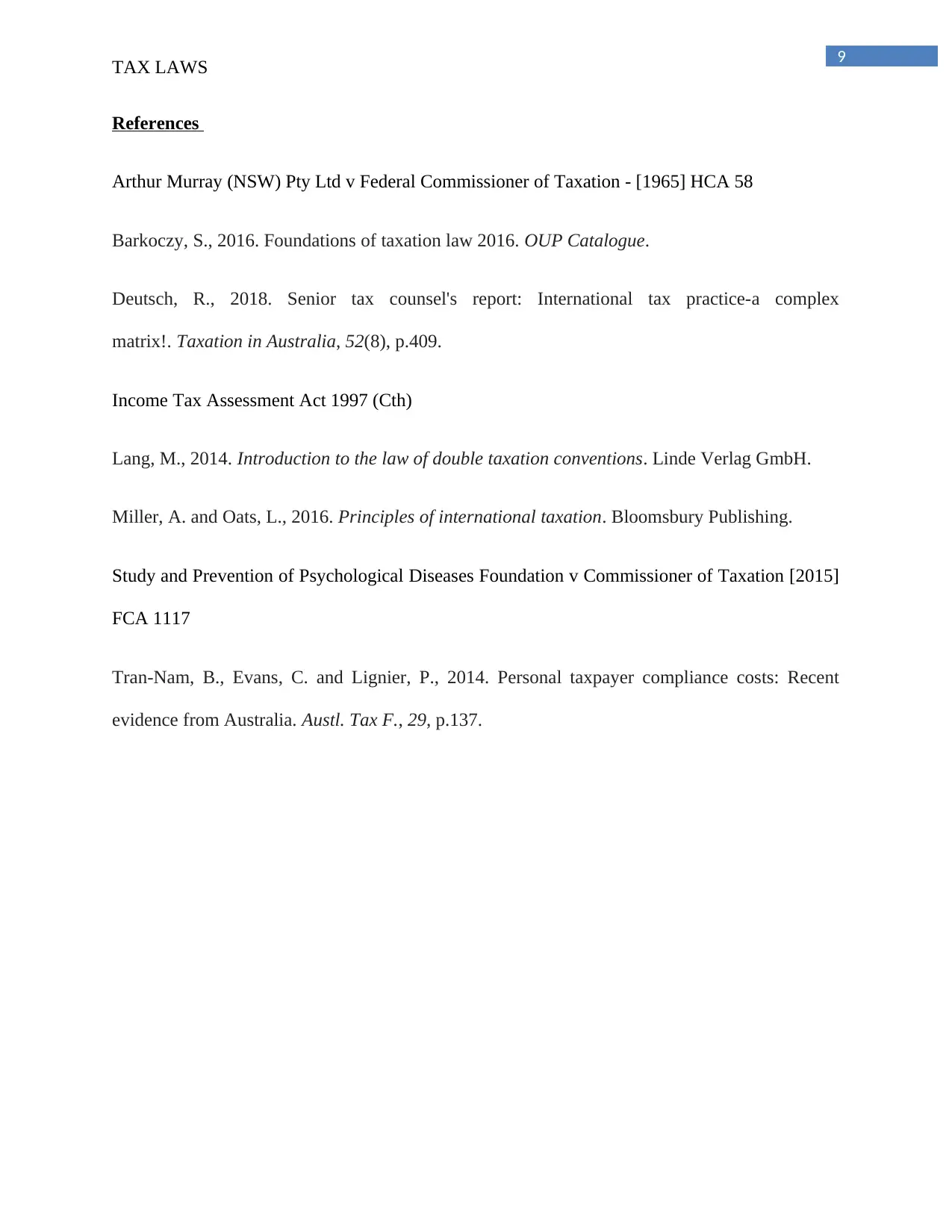
9
TAX LAWS
References
Arthur Murray (NSW) Pty Ltd v Federal Commissioner of Taxation - [1965] HCA 58
Barkoczy, S., 2016. Foundations of taxation law 2016. OUP Catalogue.
Deutsch, R., 2018. Senior tax counsel's report: International tax practice-a complex
matrix!. Taxation in Australia, 52(8), p.409.
Income Tax Assessment Act 1997 (Cth)
Lang, M., 2014. Introduction to the law of double taxation conventions. Linde Verlag GmbH.
Miller, A. and Oats, L., 2016. Principles of international taxation. Bloomsbury Publishing.
Study and Prevention of Psychological Diseases Foundation v Commissioner of Taxation [2015]
FCA 1117
Tran-Nam, B., Evans, C. and Lignier, P., 2014. Personal taxpayer compliance costs: Recent
evidence from Australia. Austl. Tax F., 29, p.137.
TAX LAWS
References
Arthur Murray (NSW) Pty Ltd v Federal Commissioner of Taxation - [1965] HCA 58
Barkoczy, S., 2016. Foundations of taxation law 2016. OUP Catalogue.
Deutsch, R., 2018. Senior tax counsel's report: International tax practice-a complex
matrix!. Taxation in Australia, 52(8), p.409.
Income Tax Assessment Act 1997 (Cth)
Lang, M., 2014. Introduction to the law of double taxation conventions. Linde Verlag GmbH.
Miller, A. and Oats, L., 2016. Principles of international taxation. Bloomsbury Publishing.
Study and Prevention of Psychological Diseases Foundation v Commissioner of Taxation [2015]
FCA 1117
Tran-Nam, B., Evans, C. and Lignier, P., 2014. Personal taxpayer compliance costs: Recent
evidence from Australia. Austl. Tax F., 29, p.137.
1 out of 10